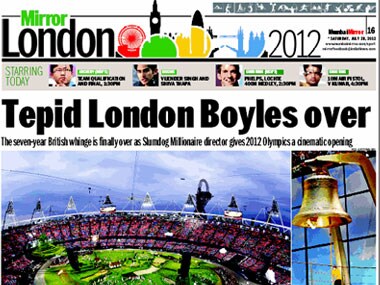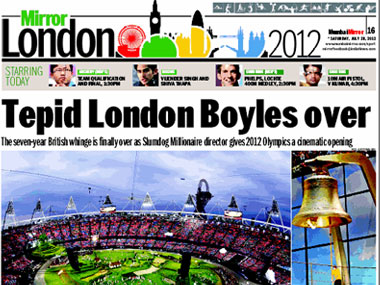“Tepid London Boyles over”, says the headline in Mumbai Mirror. “The seven-year British whinge is finally over as Slumdog Millionaire director gives 2012 Olympics a cinematic opening”, reads the strap. What in heaven does the headline mean? What is the word “tepid” doing in the headline? A quick check informs one that ‘tepid’ means ‘moderately warm; lukewarm’ as in tepid water or could mean ‘characterised by a lack of force or enthusiasm’ as in ‘tepid prose; the critics’ tepid reception for the new play.’ [caption id=“attachment_394768” align=“alignleft” width=“380”]
 Screengrab of Mumbai Mirror’s story.[/caption] Why was London tepid? Was it lukewarm or was it characterised by a lack of force or enthusiasm? Why was Britain on a seven-year whinge? First, let’s figure out what ‘whinge’ means. Whinge means to ‘cry in a fretful way’ or ‘to complain’. When used as a noun, as the strap does, it means, simply ‘a complaint’. So what was the seven-year whinge which ended as Tepid London Boyled Over? Perhaps it’s time to move away from the headline and go to the copy to find the answers. There’s no reference to tepid or to whinging. The copy gushes about how extravagant the celebration was, of a buzzing crowd, of a ‘stunning, imaginative whimsical and dramatic celebration’, of ‘a thunderous chime’, of the show’s ‘lighter moments’. Once done with the reading, one does the math. Mumbai Mirror’s writer could hardly have witnessed the entire opening ceremony. The paper would have gone to bed by 2.30 am at the latest, so an hour or so of the opening ceremony was the maximum the writer could have seen – yet the story reads, based on the tenses used, as if the writer watched, tired, excited and wide-eyed, as Queen Elizabeth II declared the Games open. The story would have relied largely on press releases, wire copies – and a fertile imagination. And a vocabulary from the recesses of which he or she saw fit to extract the words ‘tepid’ and ‘whinge’ and use them in the headline whether they were appropriate to the story or not.
Screengrab of Mumbai Mirror’s story.[/caption] Why was London tepid? Was it lukewarm or was it characterised by a lack of force or enthusiasm? Why was Britain on a seven-year whinge? First, let’s figure out what ‘whinge’ means. Whinge means to ‘cry in a fretful way’ or ‘to complain’. When used as a noun, as the strap does, it means, simply ‘a complaint’. So what was the seven-year whinge which ended as Tepid London Boyled Over? Perhaps it’s time to move away from the headline and go to the copy to find the answers. There’s no reference to tepid or to whinging. The copy gushes about how extravagant the celebration was, of a buzzing crowd, of a ‘stunning, imaginative whimsical and dramatic celebration’, of ‘a thunderous chime’, of the show’s ‘lighter moments’. Once done with the reading, one does the math. Mumbai Mirror’s writer could hardly have witnessed the entire opening ceremony. The paper would have gone to bed by 2.30 am at the latest, so an hour or so of the opening ceremony was the maximum the writer could have seen – yet the story reads, based on the tenses used, as if the writer watched, tired, excited and wide-eyed, as Queen Elizabeth II declared the Games open. The story would have relied largely on press releases, wire copies – and a fertile imagination. And a vocabulary from the recesses of which he or she saw fit to extract the words ‘tepid’ and ‘whinge’ and use them in the headline whether they were appropriate to the story or not.
Anant Rangaswami was, until recently, the editor of Campaign India magazine, of which Anant was also the founding editor. Campaign India is now arguably India's most respected publication in the advertising and media space. Anant has over 20 years experience in media and advertising. He began in Madras, for STAR TV, moving on as Regional Manager, South for Sony’s SET and finally as Chief Manager at BCCL’s Times Television and Times FM. He then moved to advertising, rising to the post of Associate Vice President at TBWA India. Anant then made the leap into journalism, taking over as editor of what is now Campaign India's competitive publication, Impact. Anant teaches regularly and is a prolific blogger and author of Watching from the sidelines.
)